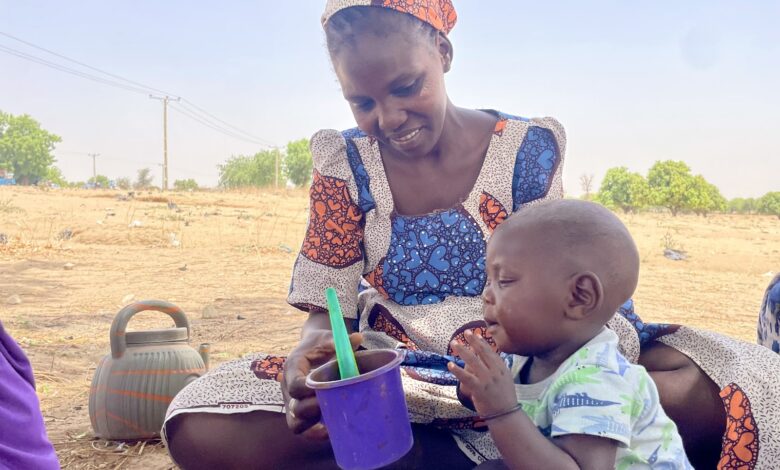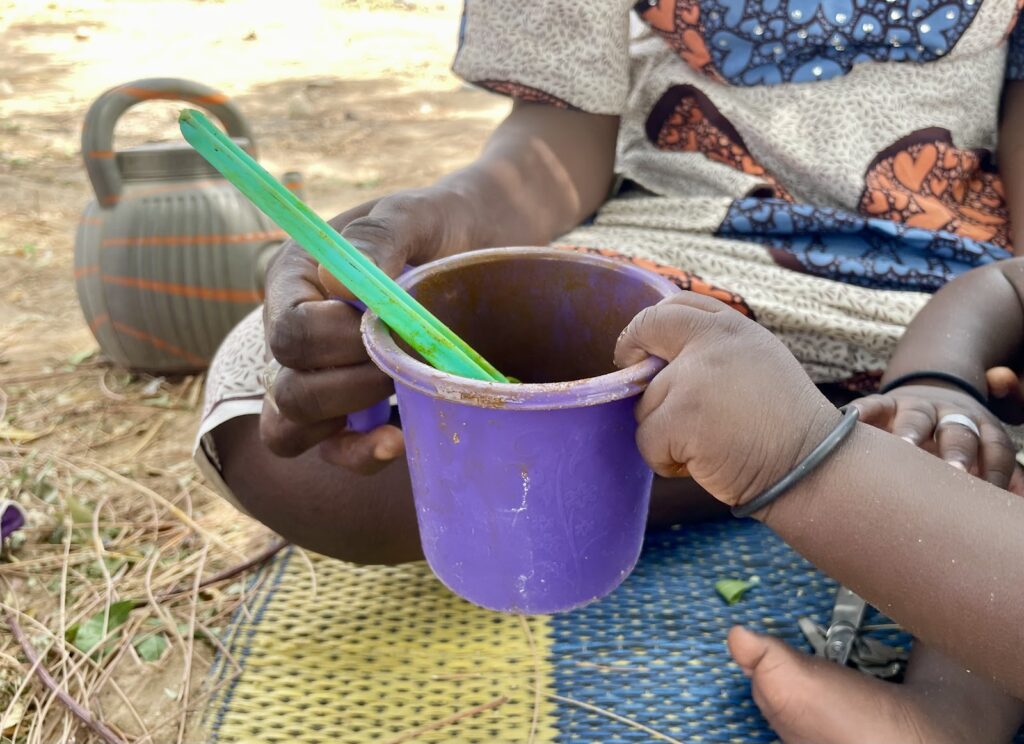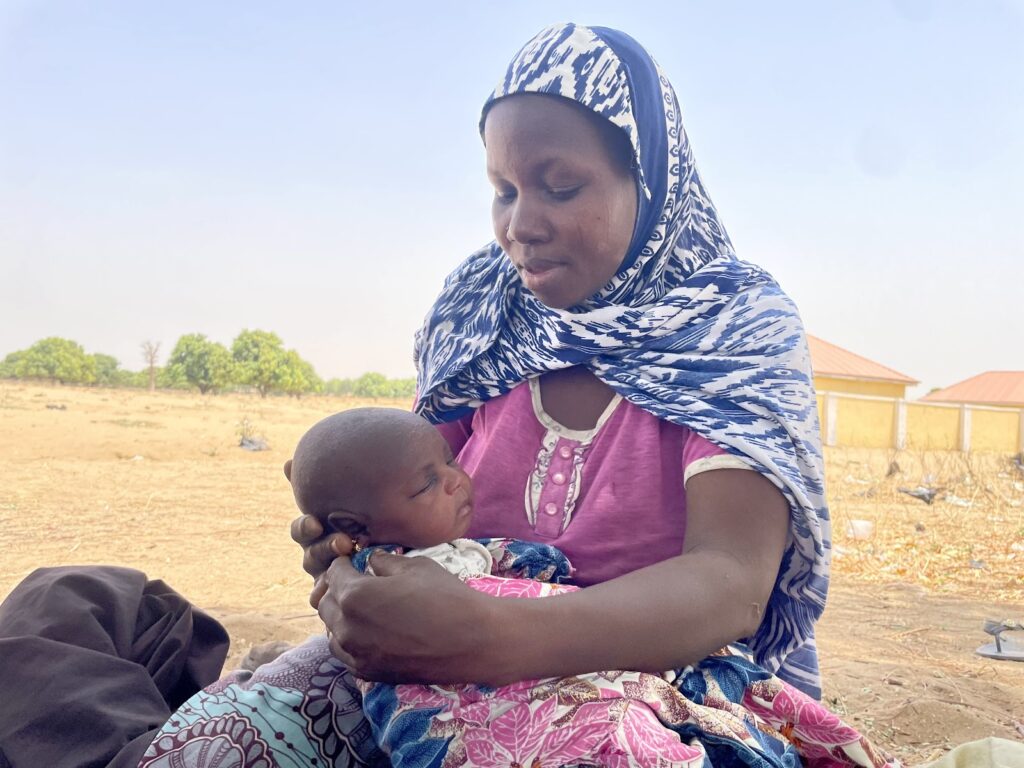Malnutrition Is Affecting Displaced Mothers’ Ability To Breastfeed Newborns In Northeast Nigeria
Displaced women, already grappling with the trauma of displacement and the challenges of survival, are now facing the heartbreaking reality of not being able to provide enough breastmilk to feed their newborns, raising concerns about their health and well-being.

Two weeks after Falmata Ibrahim gave birth, her body stopped making breastmilk for her baby.
The baby would whine for breastmilk, and in both desperation and frustration, she would let him suckle, but nothing would come out. It has been five months now, and she is still struggling to produce milk for her baby. It is all due to hunger and malnutrition, she says.
Falmata Ibrahim, 27, has been displaced for years now by the Boko Haram insurgency in Nigeria’s northeast. According to her, the challenge of feeding her infant is an unusual one as she never experienced it in her previous four births.
“I felt shocked by the experience when I tried several times to squeeze out milk. There was nothing except agonising pain in both my breasts,” she said of the experience.
About a year before Falmata started experiencing this harrowing health crisis, her family’s living conditions had worsened by the cut in humanitarian assistance in the Kawal Maila displacement camp and later the pressing life challenges after the camp was closed down by the government. Like many others in the camp, she struggled to find enough food to eat, leading to severe malnutrition.
In February, three months after she gave birth, their camp was shut down. Every household that had been issued a relocation card was conveyed to the 1000 Housing Unit area in Dalori village along the Bama—Maiduguri road, where they were allocated shelter.
A cash amount of N20,000 and food and non-food items were distributed to families, local sources told HumAngle in a focus group discussion. “I was given five yards of clothing materials, two mats, two blankets, eight mudu [One Mudu is approx. 1.5kg] of rice, eight mudu of maize,” Bana Chullu recalled.
According to Falmata, her family of seven—including herself and her husband—had exhausted the food items in less than 15 days. “The N20,000 my husband got, we spent most of it fixing the housing allocated to us, and I had to share some of the money my uncle gave me,” she says.
Some of Falmata’s relatives who reside in town already knew about her desperate situation, so her uncle assisted her with some extra cash since the money distributed by the government was only given to her husband.
Two months into the uncertainties unfolding at their new place, Falmata’s body started emaciating, and her baby was always whining.
“We only eat once daily, and often, the whole day passes without us eating anything. I noticed that my baby is just sulking with empty breasts, and that called for desperate action,” Falmata said.
The situation worsened as the days went by. Falmata’s baby became weaker as well, constantly crying from hunger pains. Falmata felt helpless, unable to provide the nourishment her child desperately needed.
She sought to alleviate her baby’s hunger by preparing food from grains and herbs, drawing upon traditional knowledge she learned from her fellow displaced mothers who were also facing hardship and food crises. With what remained of the money her uncle gifted her, she purchased the necessary ingredients to prepare the baby’s food.

With little else to rely on, Falmata turned to the wisdom passed down from generations, mixing grains and herbs in an attempt to create a nutritious meal for her baby. However, the makeshift food was often insufficient to meet the baby’s needs, leaving both Falmata and her child in a constant state of hunger and distress.
“I buy some maize, palm oil, and hibiscus leaves and grind them into powder, which I then mix with water to feed the baby,” she said.
She added, “The baby detests the consumption of the mixture, but eventually, it gets used to it, and since then, this is what I have been using to feed my newborn.”
The relocation has worsened living conditions
Despite her best efforts, Falmata’s baby continued to suffer from malnutrition and weakness.
She lamented the conditions in their new place where hunger, unemployment, and suffering are at the forefront of everyone’s problems. “I clung to the hope that someday our situation would improve, and my baby would receive the care and nourishment it desperately needed,” she told HumAngle.
“I have never experienced this problem before during the breastfeeding period in my four previous births. But here today, because of hunger and lack of nutritional food, I am suffering. I pray that my baby doesn’t get affected.”
What is it like to be in a new place already challenged by a food crisis, a lack of humanitarian assistance, competitive meagre job opportunities, inaccessible farmlands, unavailability of adequate basic amenities, and constant discrimination against new arrivals?
“It has been two months since we were relocated to this new place, yet we haven’t figured out how to adapt to the surroundings, understand the opportunities available, or cope with the pressing challenges like the discrimination we face from the locals and lack of work opportunities,” Falmata said.
“There are no jobs to do here, desolate areas, and we are many kilometres away from the city. We don’t have access to farms, our husbands are idle every day, and we struggle over scarce resources like potable water.” Falmata’s neighbour, Karu, shared her experiences navigating the hurdles of life in their new homes.
Karu further added that “when we go to fetch water or send our wards, a long distance trip, we are often discriminated against by the people we meet in the area. Our buckets stay in the queue longer than usual because the people must serve themselves first and in some circumstances the water finishes while we are still in the queue.”
According to Falmata, her husband left all the burden of fetching water on her and their children, and they usually had to trek a long distance before they got water.
“The water point we travel to fetch water is often unavailable and locked by the owners; it is mostly by luck that we get it from them,” she said.
“Another problem is the lack of an affordable transportation system. For us to go to town to look for menial jobs, we spend N1,200, and this is double what we earn out of the work we do in market areas,” she added.
Falmata and her friends who used to attempt to travel to the capital city to find menial jobs, have stopped due to so many reasons.
“We cannot afford the transport money. Many times when you travel to Maiduguri to beg on the street or get menial jobs at the market areas, you only earn a small amount of money that cannot pay half of your fare nor buy foodstuff,” she told HumAngle.
The commuters embark on a journey of over 15 kilometres from Dalori village in order to reach Gamboru market, a popular destination where they may find menial jobs.
“I wake up early in the morning, like 5 a.m., and start trekking until I am halfway through to Gamboru market, then I pay the transport fare required to complete the trip,” Baana Jamila said, explaining how she cuts the cost of her travel.
Falmata is not alone
Bintu Mallum, 37, and her eight children live in one of the houses across the sprawling displacement hub. Bintu gave birth at the new place.
When HumAngle met Buntu, her baby was 40 days old, and together, they were grappling with hunger and depressing living conditions.

“I can count the number of times my husband brought food to the family since I gave birth. I haven’t been getting enough food even before the birth of my newborn,” she narrated.
She complained that the low milk from her breasts was truly worrying, as her baby only took breastmilk. She added that her baby detests and throws out the paste nursing mothers like her prepare from grains and other plants.
“This is not the case in my previous breastfeeding experience,” she lamented. “My newborn is not getting enough because my breast cannot produce enough milk and we don’t have the money to buy baby’s food.”
“I want to give them everything they need to thrive, but I feel like I’m failing them,” she says of her children, her voice trembling with emotion.
The day HumAngle interacted with Bintu, she said it had been three days since they last cooked in the house. Hunger and desperation had clearly overwhelmed her family.
This difficult circumstance has plunged her children to the streets, hawking and fending for themselves. Her husband, who used to be a local water vendor, is now rendered jobless after he ran out of business due to illness.
The recent hike in food prices has pushed displaced nursing mothers to a point where they cannot afford anything.
For many of these women, the struggle begins with their own nutritional deficiencies. In addition to the physical toll, the emotional anguish of not being able to feed their babies weighs heavily on these mothers.
Falmata and Bintu’s stories are tragically common in the displacement camps. There is a food crisis, and without access to proper nutrition, mothers struggle to maintain their own health, let alone produce enough breast milk to sustain their babies.
“Breastfeeding is a lifeline for infants in these challenging circumstances,” Aisha Mohammed Maidala, a nutritionist and dietitian, commented on the struggle of displaced nursing mothers.
She added, “But without adequate nutrition and support for mothers, it’s impossible for them to provide the nourishment their babies need to survive and thrive.”
“It’s really a serious problem that can lead to the child being malnourished,” says Aisha.
Aisha advocates for local nutrition and diet to tackle the silent health crisis. As a founder of the non-profit Gender Environmental and Nutritional Care (GENC), she recommends local resources that nursing mothers can use to feed their babies.
“If they can have access to at least millet or local maroon sorghum, she can use it to make Pap. It shouldn’t be overcooked; allow it to be a bit watery, and not necessarily with sugar.
“It will go a long way in helping to get breast milk locally since, from all indications, they cannot afford rich tea with milo and milk,” Aisha told HumAngle.
Support Our Journalism
There are millions of ordinary people affected by conflict in Africa whose stories are missing in the mainstream media. HumAngle is determined to tell those challenging and under-reported stories, hoping that the people impacted by these conflicts will find the safety and security they deserve.
To ensure that we continue to provide public service coverage, we have a small favour to ask you. We want you to be part of our journalistic endeavour by contributing a token to us.
Your donation will further promote a robust, free, and independent media.
Donate HereStay Closer To The Stories That Matter




